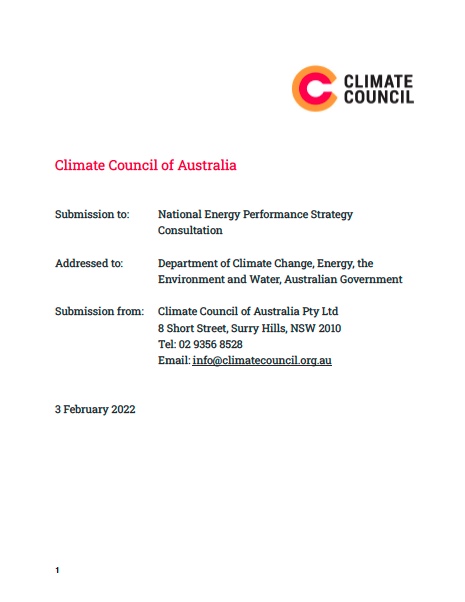The Climate Council recommends the following:
Recommendation 1: Support households to upgrade to energy-efficient electric appliances with zero-interest loans.
Low- and zero-interest loan schemes are beneficial because they address the upfront purchase and installation costs for households. Importantly, they are also more affordable for governments and can therefore be provided at significantly greater scale than direct grants or incentive payments. The Climate Council (2022) has prepared a dedicated guide for governments on the design of such schemes – How concessional financing can help reduce emissions. The ACT Government’s Sustainable Household Scheme is also a useful case study of this approach in practice
Recommendation 2: Update the National Construction Code to require new residential properties to be all-electric from 2025.
The NCC will next be updated for 2025 and now is the time to start working towards a significant update at that time to mandate all electric homes.
Recommendation 3: Require existing domestic gas appliances to be replaced with efficient electric alternatives from 2025.
A coordinated national approach is needed to mandate the replacement of gas appliances with efficient electric ones. Getting this mandate in place as soon as possible is important because household appliances can have a lifespan of more than a decade, so every gas heater or hot water service sold today will likely stay in service well into the 2030s
Recommendation 4: Coordinate through the Energy National Cabinet Reform Committee to implement and harmonise minimum energy efficiency standards in rental properties.
Rental homes often have outdated appliances and low energy efficiency – in fact, less than half of rental properties are even insulated. There is a fundamental challenge in relying on voluntary improvements to rental stock because landlords are less inclined to pay for upgrades that reduce energy costs when they do not personally benefit. This situation also exacerbates inequality whereby those who cannot afford to pay higher rents for upgraded properties, are often saddled with homes that are expensive to heat and cool. Minimum energy efficiency standards for rentals are needed for all states and territories so that everyone has a home, which is liveable, safe and more affordable to run.
Recommendation 5: Implement mandatory energy efficiency disclosure as part of property sales.
Mandatory energy efficiency disclosure makes it clear to people buying properties what they are purchasing. Making that information more visible empowers customers to make better decisions, and avoids saddling people with higher running costs. In turn, this incentivises investing in upgrades for both the buyer and seller – the seller to increase the house’s value and the buyer because they are aware of any defects and have the chance to act when renovating. Such disclosure is already in effect in the ACT; it is the only jurisdiction where the average Star performance of homes rose between 2016 and 2018, from 6.5 to 6.9-Stars.
Recommendation 6: Undertake strong reform of the Safeguard Mechanism to give businesses the right incentives and a level playing field for pursuing energy efficiency and electrification.
Mechanisms within the SGM, such as the Powering the Regions program, should focus first and foremost on incentivising and helping industry to make energy performance improvements. Assistance should prioritise measures to help achieve compliance such as funding for technology innovations that reduce emissions or access to expertise related to energy efficiency or the use of renewable energy.
Recommendation 7: Deliver a fit-for-purpose initiative such as the Energy Efficiency Opportunities program to require and incentivise large industrial energy users to pursue improved energy performance.
This should be based, among other things, on a long term strategy for industrial decarbonisation and a thorough analysis of where energy sources like gas which need to be replaced are being used, by whom and in what quantities. It could also be paired with a demonstration fund for technologies that already exist but are pre commercial, as part of Australian Renewable Energy Agency (ARENA) or Clean Energy Finance Corporation (CEFC) projects.
Recommendation 8: Explore options through the Energy National Cabinet Reform Committee to implement an overarching energy performance target with sectoral mechanisms to achieve the stated goals.
Goals should include both emissions mitigation and demand reduction, particularly peak demand. Such a target could include:
● harmonising current state based mechanisms, and
● encouraging the implementation of mechanisms in other jurisdictions, and/or
● A Federal level target, which would include sub-sectoral mechanisms that build on international and domestic experience.
Thought needs to be given to starting from adequate baselines to ensure that outcomes are measurable, reportable, and verifiable and are leading to electrification and actual reductions in emissions and energy demand.
Download the full submission here











